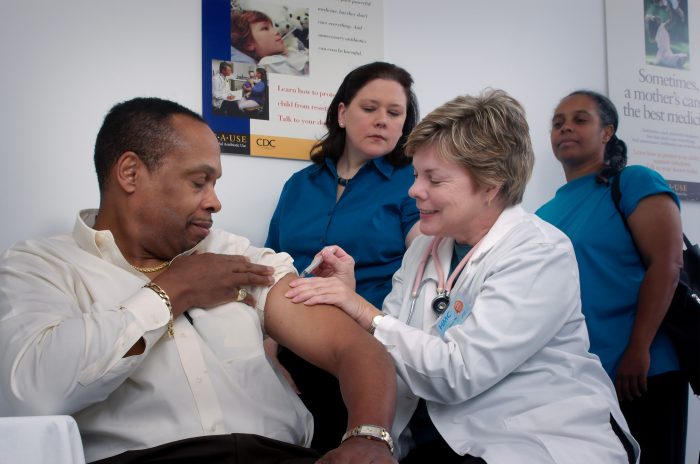COVID Surge in PA Prisons Leads to Calls for Lockdown at All Facilities
Report: Feds Need to Close Racial Gaps in Program that Helps Kids Living with Disabilities
CMS Issues COVID-19 Add-On Payment for New Treatment Interim Final Rule
The Centers for Medicare and Medicaid Services (CMS) has released an Interim Final Rule with Comment Period that will establish a new COVID-19 treatments add-on payment (NCTAP) under the Medicare Inpatient Prospective Payment System (IPPS), which is effective from November 2, 2020, until the end of the Public Health Emergency (PHE) for COVID-19. To mitigate potential financial disincentives for hospitals to provide new COVID-19 treatments during the COVID-19 PHE, the Medicare program will provide an enhanced payment for eligible inpatient cases that involve the use of certain new products with current Food and Drug Administration (FDA) approval or emergency use authorization to treat COVID-19. Comments will be accepted until the close of business on January 4, 2021.
Children’s Committee Meeting Presentation “Surviving Teletherapy and Adapting” by Susie Brookman

Wolf Administration Ensures All Pennsylvania Facilities Providing Treatment and Recovery Services Have Access to Resources to Support Tobacco-Free Recovery
OMHSAS Releases IBHS Bulletins, FFS Prior Authorization, and Provider Attestation
The Office of Mental Health and Substance Abuse Services (OMHSAS) released the following bulletins and companion documents outlining updated processes and procedures for Intensive Behavioral Health Services fee-for-service (IBHS FFS) prior authorization and provider IBHS attestation. The updated IBHS attestation bulletin extends the attestation process from October 19, 2020 until January 17, 2021. If a provider has already completed and submitted an IBHS attestation form prior to this new bulletin, no new submission is required.
Please see the following documents:
- FFS Prior Authorization Bulletin
- FFS Prior Authorization Handbook
- FFS MA 97 instructions
- IBHS Attestation Bulletin
- IBHS Attestation Form
If you have any question, please contact RCPA Children’s Division Director Jim Sharp.
Introducing the RCPA Quarterly Newsletter
Over the last several years, RCPA had produced a monthly newsletter – gathering articles and information for members on a more global basis. This was in addition to the daily (alerts, infos) and weekly information provided. Our statistics show that this newsletter was, in fact, read (or at least opened!) by membership on a fairly routine basis.
With the appearance of COVID, however, everything seemed to become “immediate.” The notion of a monthly newsletter seemed to become antiquated and out of touch with the needs of our members and what was happening to the minute of each day during an ongoing crisis.
As we look back at the last year, as a staff we discussed what perhaps had been missed by not providing this communication. We did not want to simply revisit producing the monthly newsletter, just because that’s the way business had always been; those times have passed.
But admittedly, there are some things that are falling through the cracks during this “everything is now” culture. So after discussion, we are moving to the creation of a Quarterly Newsletter – but not one that simply rehashes all that we have already sent out to membership. You have this information already, and by the time of our newsletter publication it may be “stale” or even outdated.
Rather, this publication will focus on topics such as the following:
- Articles from provider members and businesses on a range of topics;
- Programs / best practices / technology highlights;
- Introduction of new members;
- Content from our national association partners that has not been covered elsewhere;
- Updates from our growing Diversity, Equity, and Inclusion (DEI) Committee;
- Updates from other projects (e.g., Media Campaign) and committees;
- Member updates (e.g., honoring staff, awards given);
- Legislative tracking updates; and
- Conference and educational updates and opportunities.
Please join us in the creation of this newsletter and in assisting with the content of this new publication. We hope you will enjoy this addition to the RCPA member communication. We envision this new endeavor beginning in March 2021.













